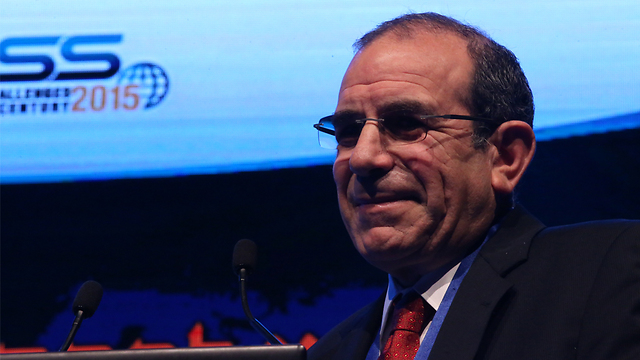The U.S. announcement that it would host Israel and the United Arab Emirates at a special White House signing ceremony came barely one month after word of the Abraham Accord between Jerusalem and Abu Dhabi first broke, and before Bahrain joined the agreement.
The breakneck speed with which the official White House ceremony was announced surprised several former members of Israeli diplomatic negotiation teams, who shared their thoughts about the curious turn of events.
5 View gallery
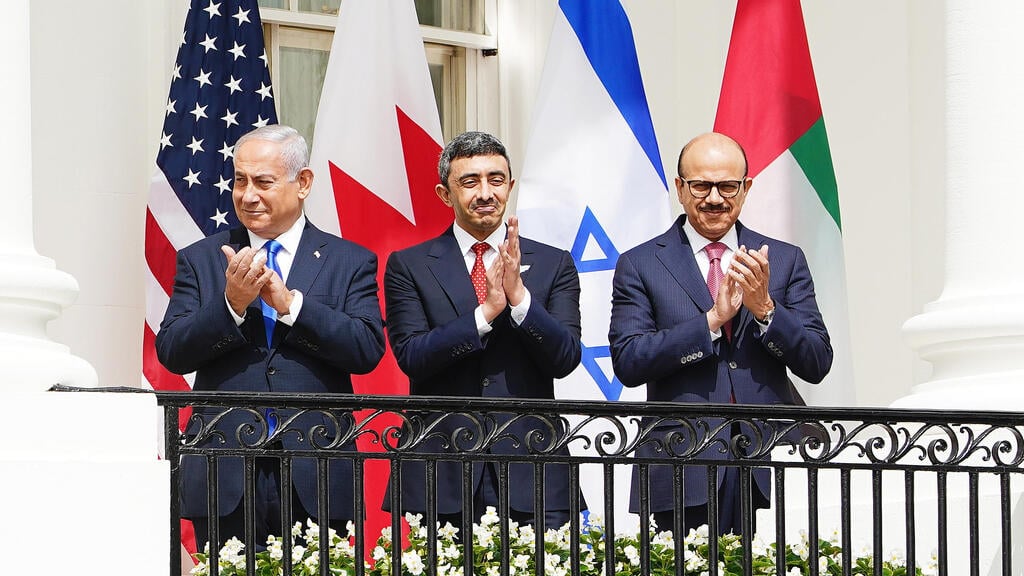

L-R: PM Benjamin Netanyahu, Emirati FM Abdullah bin Zayed Al Nahyan and Bahraini FM Abdullatif bin Rashid Alzayani at the White House event
(Photo: AP)
“A formal agreement takes a lot of time to articulate and draft. It has to go through legal experts who weigh every word,” says Brig. Gen. (ret.) Michael Herzog, a Washington Institute international fellow, adding that the ceremony was mostly a symbolic event meant to commemorate the recent breakthrough, like a letter of intent.
“It’s no coincidence it was done in such a hurry,” says Herzog, who participated in most of Israel’s negotiations with the Palestinians, Jordanians, and Syrians since the early 1990s, including the Wye Plantation, Camp David, Taba and Annapolis summits.
“The Americans wanted to do it before the [presidential] elections. But the order of things is reversed. First they have a ceremony and only then they’ll try to translate that into a series of bilateral pacts.”
Gilead Sher, a senior researcher at the Institute for National Security Studies who served as former prime minister Ehud Barak’s chief of staff, agrees.
“I think this whole story still hasn’t been made clear to the public,” says Sher. “We know just the general outline [to the agreement], and maybe that’s all they [were] going to sign. That would explain the timetable.”
5 View gallery
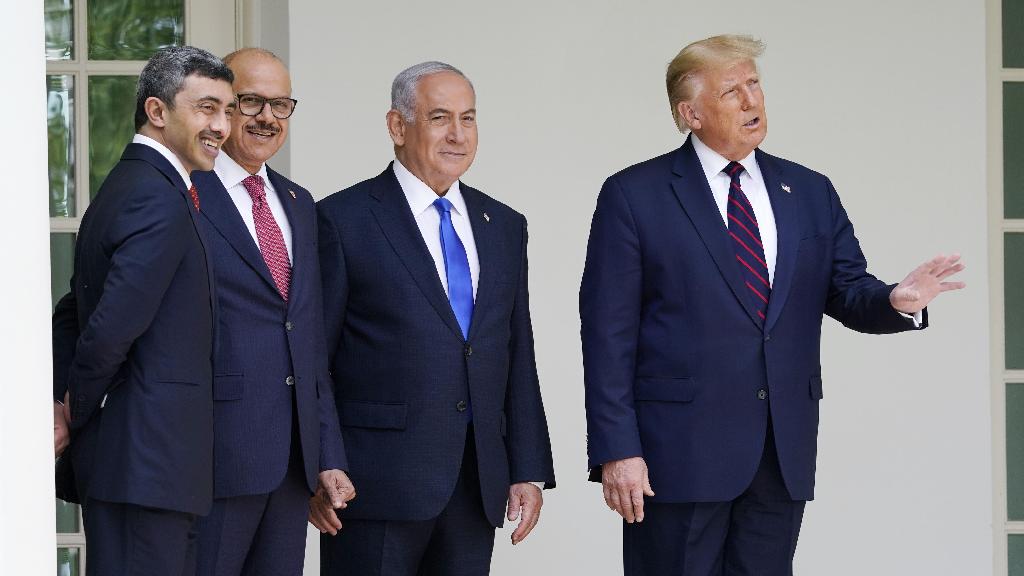

L-R: Emirati FM Abdullah bin Zayed Al Nahyan, Bahrain FM Abdullatif bin Rashid Alzayani and PM Benjamin Netanyahu accompany U.S. President Donald Trump at the White House signing ceremony
(Photo: AP)
“But there was never a real conflict here,” says Sher, who was Israel’s top peace negotiator in 1999–2001, at the Camp David and Taba summits, and participated in the 1995 Oslo talks as well.
“There were no combat zones, no territorial disputes, no violence. This isn’t a historic breakthrough after a long, drawn-out negotiation, but merely a normalization of relations already over 25 years old," he says.
“This is simply a diplomatic cover for what is essentially a financial and military deal. Therefore, I don’t think it’s too complicated [to arrange the ceremony].”
The ceremony held on September 15 was hosted by U.S. President Donald Trump, and attended by officials from the three countries, including Prime Minister Benjamin Netanyahu, who released a statement thanking Trump for hosting the “historic” ceremony.
The UAE delegation, however, consisted of only second-tier dignitaries, headed by Foreign Minister Abdullah bin Zayed Al Nahyan.
5 View gallery
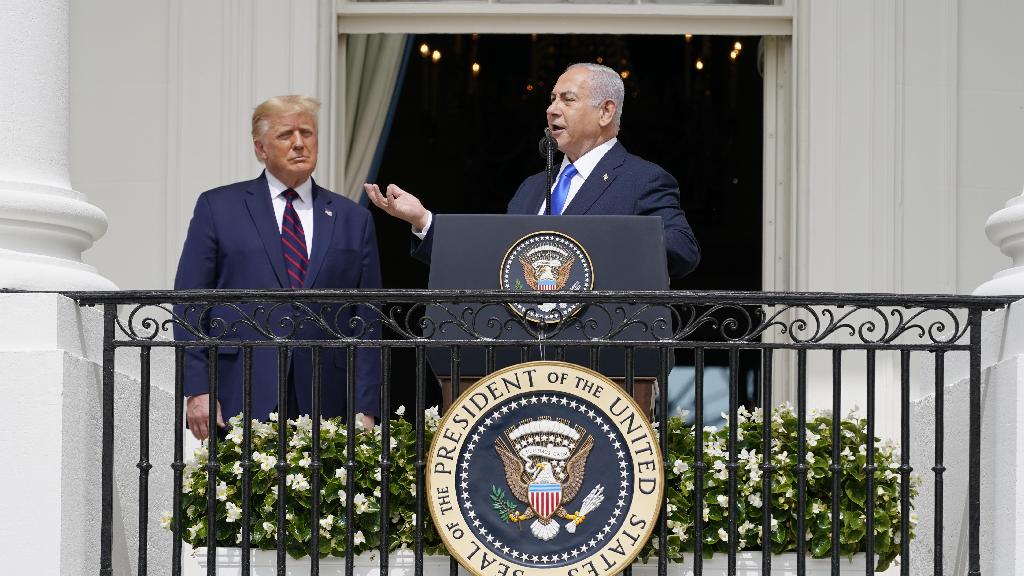

Prime Minister Benjamin Netanyahu speaks as U.S. President Donald Trump looks on during the White House signing ceremony
(Photo: AP)
Sher and Herzog both see the move as significant.
“It says a lot,” Herzog says. “It means that despite all the advancements made by [de facto UAE leader Mohammed bin Zayed] and the brave step he took [in normalizing relations with Israel], the Emiratis still have certain inhibitions and some sensitivity towards the Palestinian question and Arabic public opinion."
He adds: “Perhaps there are other issues bothering them, like Israel’s statements regarding the F-35 [fighter jet] deal. But you just can’t ignore the fact that two leaders were present and the third was absent.”
Sher warns Netanyahu was “making a diplomatic mistake” by personally attending the event.
"We [upgraded] the delegation on our side while the Emirati’s downgrade their representatives,” he says . “This is a way for [the UAE] to send a message to its people – ‘don’t make such a big deal out of this.’”
5 View gallery
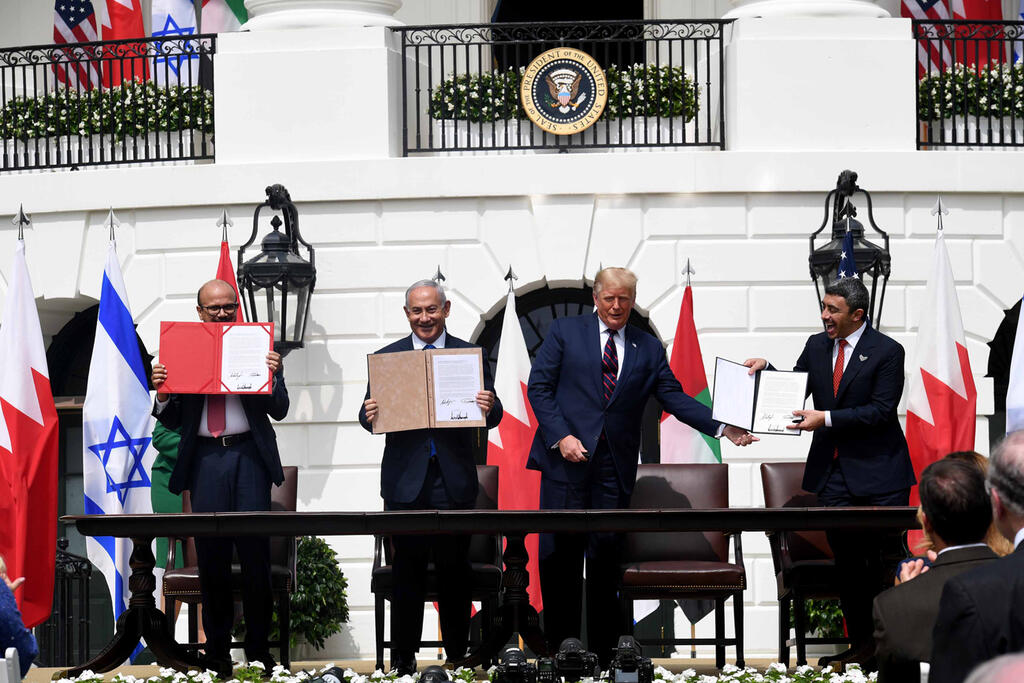

L-R: Bahrain FM Abdullatif bin Rashid Alzayani, PM Benjamin Netanyahu, U.S. President Donald Trump and Emirati FM Abdullah bin Zayed Al Nahyan at the White House signing ceremony
(Photo: GPO)
On August 13, Trump announced he had brokered a deal to normalize ties between Israel and the UAE. The Gulf state agreed to officially recognize Israel’s right to exist and to solidify bilateral economic and trade relations.
In return, Netanyahu consented to indefinitely postpone his plans to annex territories in the West Bank, while green lighting an arms deal between the UAE and the Trump administration that would include the sale of state-of-the-art F-35 fighter jets to the Gulf nation.
Netanyahu has since denied agreeing to such a deal.
Alternate Minister Benny Gantz and Foreign Minister Gabi Ashkenazi, bitter political rivals of Netanyahu from the Blue & White party, were both absent from the ceremony in Washington.
As to the actual ceremony, the two former diplomats see it as mere theatrics.
“The rules are that everything is hammered out and scripted, down to the most minute details,” Sher says, noting that the heads of states’ addresses, standing positions, and lineup are all determined in advance.
“They also agree ahead of time on the press releases, that usually tend to include an extra nugget, some ‘fresh news’ to entice reporters and the public.”
But, Sher says, there may be exceptions to the rule, when things go off-script, “either because one of the actors forgets his role or because he intentionally wants to provoke the other sides, trying to gain one last concession from his negotiating partners.
“[The late PLO chair Yasser] Arafat was a master of trying to squeeze that last drop out of the lemon,” Sher says. “Something can always go wrong.”
Article written by Uri Cohen, reprinted with permission from The Media Line


